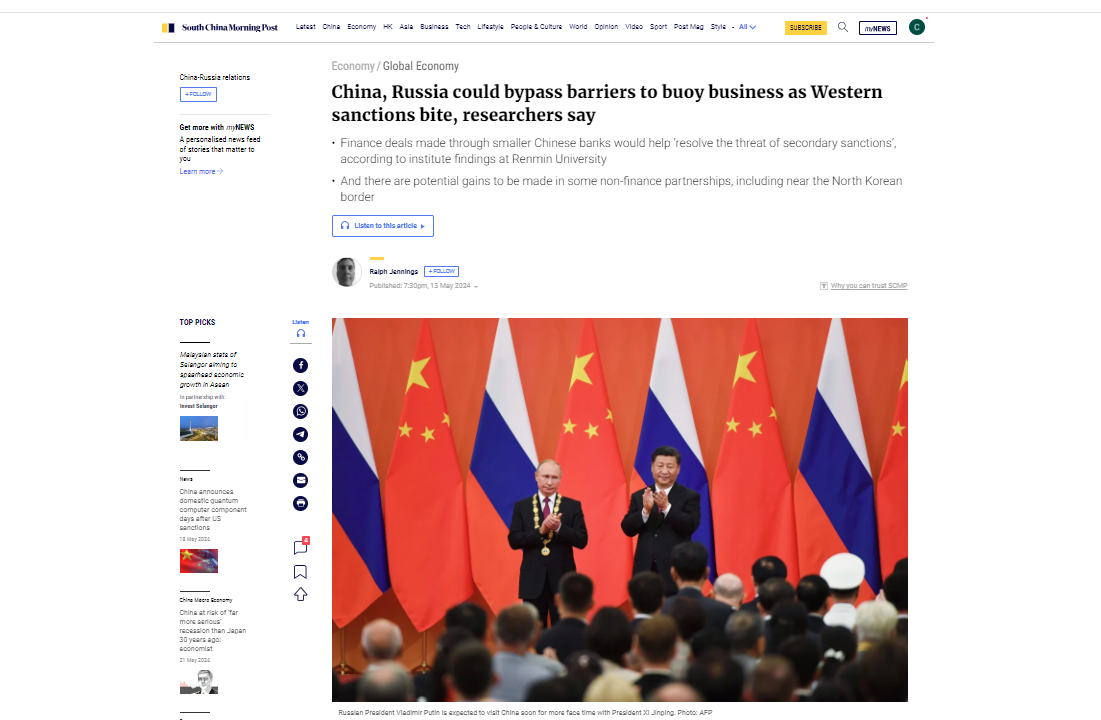LATEST INSIGHTS
Your Present Location: LATEST INSIGHTS[RDCY Report] China, Russia could bypass barriers to buoy business as Western sanctions bite, researchers say
Source: SCMP Published: 2024-05-21

China and Russia should explore using their own platforms – and could tap obscure banks – to settle payments while strengthening ties in the Russian far east, if the neighbours want to get around Western economic sanctions over Moscow’s war in Ukraine, a Chinese research organisation says.
Smaller Chinese banks could be “promoted” for trade with Russia, while setting up new financial institutions could help “circumvent Western sanctions”, according to a May 11 report by the Chongyang Institute for Financial Studies at the Beijing-based Renmin University.
Sanctions from the West had suspended 80 per cent of payment settlements between Russia and China as of March this year, “severely impacting normal trade and commercial relations”, the institute said.
“To solve the current investment dilemma between China and Russia, the top priority is to build new payment-and-settlement channels as soon as possible, and resolve the threat of secondary sanctions on financial institutions,” it advised.
Moscow’s invasion of Ukraine in February 2022 sparked financial restrictions on Russia by the West. American and European Union leaders have also decried China’s sustained Russian trade that has been accused of possibly helping Moscow get around their sanctions.
Russia has increasingly looked to China for economic support amid the sanctions. And China, for its part, needs Russian crude oil and coal for manufacturing and energy security.
Keen on not getting stung by sanctions, Chinese banks have halted several deals related to Russia after Moscow’s expulsion from the Swift network of 11,000 financial institutions that exchange money transfer instructions.
China-Russia trade rose 26.3 per cent in 2023 to US$240.1 billion, but Chinese direct investment in Russia makes up just 0.36 per cent of China’s global total. Settlements for trade are often delayed as Chinese banks tread carefully.
In the short term, the research report says, China should look to make settlements through smaller regional banks that are already operating but which lack business with the West.
It further suggests that the two countries use the Russian central bank’s System for Transfer of Financial Messages and China’s Cross-Border Interbank Payment System. Both are alternatives to Swift.
China and Russia should eventually develop their own payment processes “with a medium- to long-term perspective”, according to the report.
Reached for a comment about the proposition, Zhao Xijun, a Renmin finance professor who is not part of the research organisation, said it was possible that smaller banks could lose money by settling payments with Russia if they did not have other business with Russia to raise the transaction’s value.
And utilising the Cross-Border Interbank Payment System would work, Zhao said, but doing so would still require banks to make transactions and accept risks of backlash from the West.
“The thing they need to do is set up a new framework for making transactions,” he said, explaining that such a framework would probably rely on the Chinese yuan.
Outside the finance system, the report suggests, China and Russia could increase their economic cooperation by cutting fees and taxes for their small or medium-sized enterprises. The two should also create railway and port “networks” in the Russian far east, it added.
In that vein, the research report says, China should negotiate with Russia for rights to use and develop the Tumen River estuary, which forms the Russia-North Korea border and empties into the Sea of Japan, or East Sea. China’s involvement would “promote the common development of both parties”, the report said.























































































 京公网安备 11010802037854号
京公网安备 11010802037854号





